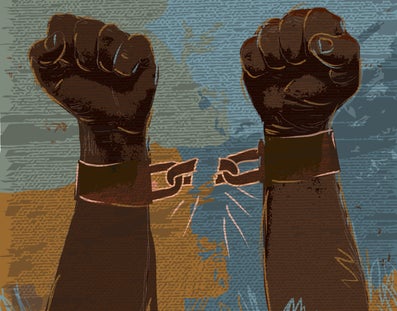11 November: Theatre performance ‘Ik zeg toch sorry?’
What does it mean to say sorry in 2022 for something that seems so long ago? On 11 November, there will be a showing of Raymi Sambo's theatre performance ‘Ik zeg toch sorry?’ (only in Dutch) at VU Griffioen. It is about our shared history of slavery, however unjustly the roles were divided.
9 October: Martin Luther King lecture
In this year's Martin Luther King Lecture, we will join Anthony Bogues in looking at the contributions of activism and protest against the injustices stemming from the history of slavery, and the relevance of King's ideas – as outlined in his work Why We Can't Wait – to today's world.
7 June: PhD defence 'Race and Religion. Re-membering their displacements, supersessions, and geographies’
On 7 June 2023, Matthea Westerduin defended her dissertation on race and religion.
15 June: Beyond Return, a guided tour of the VU ART SCIENCE gallery
During the Déjà VU festival on 15 June, Professor of Contemporary Art History Katja Kwastek and artist Aram Lee discussed colonial heritage and Aram Lee's work "Tropical Objects, Turns", during a tour of the VU ART SCIENCE gallery.
29 June: Can you talk about race without talking about history?
On 29 June, join a critical forum about the perception of historical oppression in relation to the present.
6 July: What does the future of theology look like in a postcolonial era?
In the postcolonial era, how can non-Christian religions gain equal footing with academic institutions stamped by Western Christianity? What does the future of theology and religious studies look like? The seminar 'The Future of Theology and Religious Studies' will revolve around these questions.
7 July: PhD defence "A Certain Class of Undesirables"
On 7 July, Nawal Mustafa will defend her dissertation on the regulation of interracial intimacy in the British national context between 1948 and 1968.
17-29 July: Summer school in Indonesia ‘“The Empire Writes Back” Revisited - Imagination, (Post)Colonial and Transnational Dialogues’
From 17 to 29 July 2023, VU Amsterdam is organising a summer school in Indonesia and online, in cooperation with the Universitas Gadjah Mada. Students from the Netherlands and Indonesia engage in a dialogue covering postcolonial and transnational perspectives on the colonial past of Indonesia and other former colonies. Sources for these conversations comprise the study of historical, literary and new media sources from both countries.

